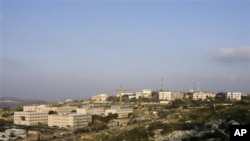It was just a couple of months ago that a group of actors, playwrights and other performing artists refused to perform in a new arts center in the West Bank settlement of Ariel. Now, more than 160 Israeli academics have signed a petition boycotting Israeli’s Ariel University Center of Samaria, located in the same settlement. The letter’s co-signers say they oppose the Israeli occupation of the West Bank and the establishment of Israeli settlements. The letter also states that only a few miles away from Ariel, Palestinians live in what it terms “unbearable” living conditions, without “basic human rights.”
The letter was initiated by Dr. Nir Gov, professor of chemical physics at the Weizmann Institute of Science in Rehovet, Israel. He spoke with VOA’s Cecily Hilleary from his office in Rehovet.
|
Listen to the full interview with Nir Gov:
|
Hilleary: What was your motive?
Gov: The long-range motive that we have is to try to shorten as much as possible the duration of the occupation, to hasten as much as possible the ending of the occupation of the West Bank, and bringing about the division of this land between the Israelis and the Palestinians in a two-state, peaceful solution.
More realistically, we thought that this time is an opportunity to continue the momentum which was already started by the artists in Israel, [who] boycotted Ariel and have shown that actually, this consensus which has been shown about the inevitability of these settlements as something which is here to stay and cannot be changed is actually a fake consensus.
Hilleary: How large a settlement is Ariel?
Gov: Ariel has a few tens of thousands [of] settlers, and the college has about 10,000 students, so it’s not insignificant. But we think that it is extremely able to be taken down, and this is not something which is impossible to do. The removal of the settlements, even a large settlement like Ariel - with the college included - is something that Israel can do and must do, if it wants to reach that division of this land.
Hilleary: What has the government’s response been to your letter?
Gov: The official response that was voiced in public by the Ministry of Education was that they are very much against any sort of boycott and that they are very sorry that we took this action.
There was, unfortunately and very surprisingly, a reaction by the organization of the heads of the universities in Israel, the researching organization which basically is a committee where all the university heads meet [the Committee of University Heads in Israel].
The committee is headed by [Professor Rivka Carmi] the President of Ben Gurion University in the Negev. And they voiced their opposition to this action, which I thought was surprising, and the other academics thought was surprising, because this committee is usually dealing only with higher education issues and not with political matters.
And, by their reaction, they basically place themselves as supporters of the college in the settlement, which I think is a very problematic position for them to [take].”





